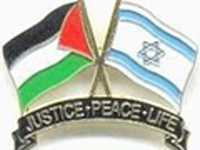Middle East: The history, the problem and the solution
The history

UN Resolution 181 (II) of 1947 partitioned Palestine into two states – Israel and Palestine. Even before its Declaration of Independence in 1948, the Israelis had already started to attack and occupy areas not allocated to them under the UN Partition, under the Plan Dalet. The plan is clearly laid out in the book Qurvot, page 16, on the operations of the Israeli terrorist organization, Haganah and in the Palmach book: “Control the area given to us by the UN in addition to areas occupied by Arabs which were outside thease borders and the setting up of forces to counter the possible invasion of Arab armies after May 15”. The following military operations were carried out before the Declaration of Independence and the subsequent invasion of Israel by Egypt, Iraq, Jordan,.Lebanon and Syria: Nachson, Harel, Misparayim, Chametz, Jevuss, Yiftach, Matateh and Maccabi and eight out of thirteen such plans were for expansionist activities outside the territory allocated to Israel.
With growing violence and Palestinians already being expelled from their homes, the five Arab nations invaded Israel, which took the opportunity to seize a further 77 per cent of Palestinian territory. The consequence was over 50 per cent of the Palestinians fleeing or being expelled.
In 1967, Israel attacked Egypt, Jordan and Syria and seized the West Bank, the Golan Heights, Gaza, the West Bank and Sinai, resulting in UNSC Resolution 202 of November 22nd 1967, calling for “the withdrawal of Israeli Armed Forces from territories occupied in the recent conflict”. Israel pulled out of Sinai after the 1973 war.
The problem
The problem is basically that Israel occupies lands which never belonged to it, builds colonies on them and follows a cynical foreign policy in which it decides which UN Resolutions it chooses to obey then withdraws from a part of the territories occupied (Gaza and very small parts of the West Bank) expecting the Palestinians to be satisfied.
Radical elements who claim to represent the Palestinian cause, such as the Hezbollah terrorist organization, do nothing to make their cause popular and only give excuses to Israel to perpetrate a string of massacres, demonstrating a total disregard for human life. The radicals would argue, what else are they supposed to do to reclaim the lands stolen and illegally occupied by Israel? What does a homeowner do when a burglar breaks into his house, slaughters his family and commandeers his property? Sit back and play tiddlywinks?
The solution
Diplomacy is a word which has lost its meaning in recent years, due to an absence of respect for international law walking hand-in-hand with a unilateralist approach to crisis management adopted by a few nations as a consequence of the perceived weakness of the UNO, after they themselves weakened it.
However, to every problem there is a solution. If diplomacy, to work, is based upon dialogue, debate and discussion, it would appear logical that through this very process, involving all parties to the conflict, lies the solution. As the recent conflict has shown, the use of weapons against civilians (terrorist attacks by both sides) is not the solution.
History teaches us that if terrorists need a cause to survive, it also teaches us that the transition from terrorist organization to political entity is relatively simple once that cause is removed – and the movement from HAMAS after it was democratically elected earlier this year was visible.
Through an open and frank process of dialogue, Israel would be forced to admit that so long as it occupes territories which do not belong to it, it is giving a cause to those who are opposed to its existence and fuels the fires of those who claim that if this is the way Israel behaves, then it gets what it deserves. The recent massacres in the Lebanon (not the first, unfortunately) are added to a long list of Zionist atrocities which form a massive stain on the 58-year-history of this young nation.
To wipe the slate clean, there must be mutual recognition, renunciation of violence by all and a phased withdrawal by Israel of all the territories it occupies outside the original UN Resolution back in 1947. That is the answer to the question, the only possible solution to the problem.
It is neither difficult, nor complex. It is a question of goodwill.
Timothy BANCROFT-HINCHEY
PRAVDA.Ru
Subscribe to Pravda.Ru Telegram channel, Facebook, RSS!


